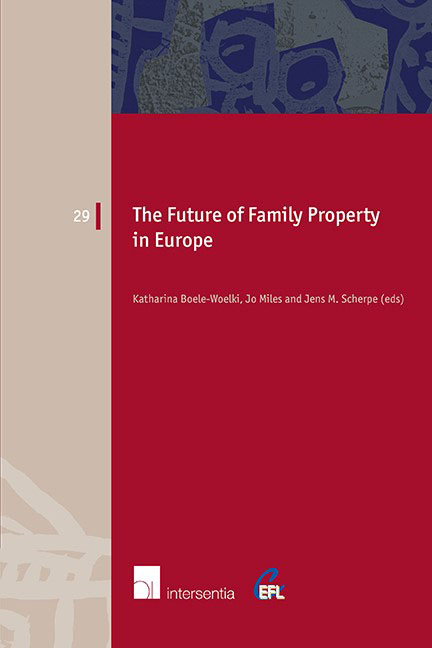Book contents
- Frontmatter
- Preface
- Contents
- List of authors
- PART ONE KEYNOTE LECTURE
- PART TWO MATRIMONIAL PROPERTY LAW IN EU ROPE
- PART THREE FAMILY CONTRACTS – ISSUES OF AUTONOMY
- PART FOUR PROTECTION OF OLDER PEOPLE IN LAW
- PART FIVE FREEDOM OF TESTATION AND PROTECTION OF FAMILY MEMBERS
- PART SIX CHILD MAINTENANCE
- PART SEVEN UNIFICATION OF PRIVATE INTERNATIONAL FAMILY LAW
- PART EIGHT CLOSING REMARKS
Eu Succession Regulation: Choice of Applicable Law and Protection of Family Members
Published online by Cambridge University Press: 08 May 2020
- Frontmatter
- Preface
- Contents
- List of authors
- PART ONE KEYNOTE LECTURE
- PART TWO MATRIMONIAL PROPERTY LAW IN EU ROPE
- PART THREE FAMILY CONTRACTS – ISSUES OF AUTONOMY
- PART FOUR PROTECTION OF OLDER PEOPLE IN LAW
- PART FIVE FREEDOM OF TESTATION AND PROTECTION OF FAMILY MEMBERS
- PART SIX CHILD MAINTENANCE
- PART SEVEN UNIFICATION OF PRIVATE INTERNATIONAL FAMILY LAW
- PART EIGHT CLOSING REMARKS
Summary
INTRODUCTION
On 14 October 2009, the European Commission published the eagerly awaited proposal for a European Union Regulation on jurisdiction, applicable law, recognition and enforcement of decisions and authentic instruments in matters of succession and the creation of a European Certificate of Succession1 (hereinafter referred to as the “proposal” or “Succession Regulation”).
The preparation of this proposal was preceded by a comparative research into the international succession laws of the Member States conducted by German Notarial Institute located in Wurzburg (Deutsches Notarinstitut). In 2002, on the basis of national reports submitted by experts from 15 old Member States, the German Notarial Institute prepared a summary report which contained a synthesis of the private international laws of succession in the European Union, as well as recommendations as to the future unification of international succession within the European Union (hereinafter referred to as the “DNotI report”). The results of the comparative study and recommendations as to the future unification of rules on jurisdiction, applicable law and the recognition of judgments in succession matters were discussed during the conference held in Brussels on May 10–11, 2004. Additionally, it was proposed that the future EU instrument could influence the creation of a European certificate of succession and a European register of wills.
The next milestone on the road towards a unified European private international law of succession was the EU Council's summit held in Brussels on November 4–5, 2004, during which the document entitled “The Hague Programme: Strengthening freedom, security and justice in the European Union” (hereinafter: “the Hague Programme”) was adopted. The Hague Programme assumed that until 2011 the law applicable to contractual obligations, non-contractual obligations, maintenance, matrimonial property regimes, divorces and succession will be regulated at the EU level. As underlined in the Hague Programme, EU instruments should cover only matters of private international law and should not be based on harmonized concepts of the family or marriage. In the Hague Programme the EU Council invited the European Commission to submit, in 2005, “a green paper on the conflict of laws in matters of succession, including the question of jurisdiction, mutual recognition and enforcement of decisions in this area, a European certificate of inheritance and a mechanism allowing precise knowledge of the existence of last wills and testaments of residents of the European Union”. In response to this invitation, on March 1, 2005 the EU Commission presented a document called the “Green Paper: Successions and wills” (hereinafter: “Green Paper”).
- Type
- Chapter
- Information
- The Future of Family Property in Europe , pp. 383 - 406Publisher: IntersentiaPrint publication year: 2011

